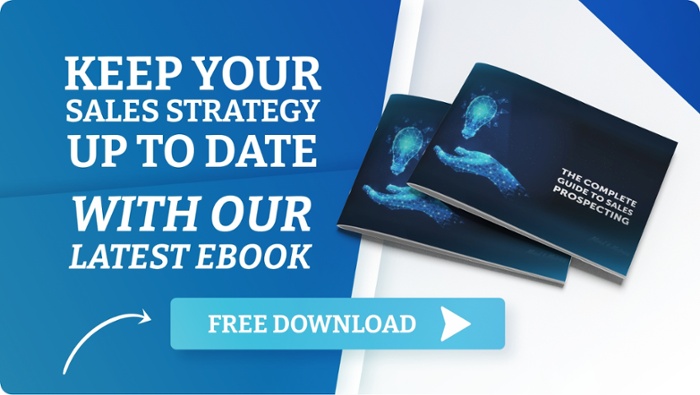Random cold-calling, over-selling, or straight up begging. These kinds of pushy sales approaches, used by sleazy salespeople since the dawn of retail, have caused customers to generally distrust anyone trying to sell them a product or service. While these strategies have worked for some salespeople in the past, you don't need to use these tactics to meet your quota. In fact, using aggressive sales tactics these days is much more likely to alienate your customers than get them to close the deal.
Buyers are now more informed than ever, and are easily able to do online research on companies and products without talking to a salesperson at all. They know that they can have their pick of products, and don't need to tolerate any sort of unsavory sales pitches on their way to making a purchase. With the options the internet provides, they can easily switch to a different company to suit their needs.
Much of today's buyer's journey is carried out online by the customer without the help of a salesperson. So, when you do get a chance to engage with a customer, it's important not to blow it!
But what kinds of aggressive sales tactics should you avoid? Keep reading to learn how to get the sale without being pushy!
1. Inundating Customers with Calls and Emails
One of the most potentially annoying sales tactics of all is bombarding customers with calls and emails.
If you send your potential customer five emails within 24 hours, they're not going to admire your tenacity - it will just irritate them. Pestering leads with tons of phone calls won't make them eager to do business with you either.
Instead, they'll see you as desperate and disorganized, and soon realize that the only way they can get any peace is to block your calls and divert your emails to spam.
Try to make your approach to sales prospecting more measured. While persistence is important, reaching out too frequently or a very large number of times ends up wasting both your time and theirs. Don't reach out more than once in a 24-hour period, and try and provide your leads with actual value, such as educational content in emails, when you contact them.
Statistically, it takes about 8 touchpoints or contacts to get a response from a lead, but reaching out more times than that will leave you with diminishing returns.
2. Telling Instead of Asking
Potential customers don't want to listen to you telling them what they need, because chances are, they know what they need more than you do.
Your prospects only care about how your product or service can help them solve problems in their lives. And the only way for you help them solve their problems is to listen to what they are.
During discovery calls, ask effective open-ended questions that will help you discover more about your prospects' pain points. Non-pushy sales tactics like this help you better understand their position and make it easier to tailor your approach to their needs.
Then, when you have a good handle on their situation, you can present your product or service as the solution.
3. Rushing the Customer
Want to know how to close a sale without being pushy? Give your customer the facts and then come back to them later.
While it's true that limited-time offers do entice people to buy, rushing customers can often have the opposite effect.
Customers want to feel in control, as though they're the ones making the decisions. Rush them into signing on the dotted line, and they'll likely want to take a step back.
What's more, speeding through the sales process for a quick result often means limiting yourself to playing the short game. Even if they don't cancel the contract right away, they are less likely to stay with your company in the long-term if they feel rushed or pressured.
4. Over-selling
As previously mentioned, consumers are able to do plenty of research before making a purchase, so they likely have a pretty good idea of what they want to buy before they speak to a salesperson. So trying to convince your leads to buy extra items or a more expensive tier of your service may not be so effective. Of course, salespeople should make their potential customers aware of add-ons and their benefits, but trying to pressure leads into significant and unnecessary upgrades will likely result in the lead abandoning the sale.
Salespeople may have been able to get away with over-selling in the pre-Internet era when it was more difficult for consumers to compare different companies and products, but this is no longer a reliable sales tactic.
There's also the matter of over-promising. Unfounded guarantees and unmet promises will not reflect well on you or your company.
5. Arguing and Interrupting
Aggressive sales tactics are bad enough, but arguing with or interrupting your leads is even worse. This should be a no-brainer, but many people may not realize that they are not the greatest listeners.
If you want to work in sales, you have to listen closely to your customers' wants and needs. Don't argue, don't interrupt, and don't talk over your customers. The customer might have lied to you or your product may well be exactly what they need. But do you want to prove a point or do you want to make a sale?
And if, at the end of it all, a customer is telling you that they're not interested, take the refusal on the chin and try another lead.
6. Selling to Anyone
Do you boast that you're such a great salesperson because you can sell to anyone? If so, it's time for a reality check.
It's time to stop pushing your products on anyone with a pulse, regardless of whether they need or want your product.
Instead, you need to focus on selling your product or service to your established buyer personas, as you already know they're a good fit for your product.
7. Fake Enthusiasm
You might believe in your product. You may think your service is one of the best out there. But being overly enthusiastic and smiling inanely while you talk about pet insurance or stairlifts is sure to come off as disingenuous.
Remember, you're not a clown, you're a salesperson. Be engaging but realistic.
How to Close More Deals
So we've told you what not to do - now here are some effective tactics for building rapport with your leads and closing more deals.
How do you do research on your leads before you contact them to predict if they'll be a good fit? What do you say during the first phone call or in the first email? Find out in our free eBook, The Complete Guide to Sales Prospecting! Click the button below to download.


